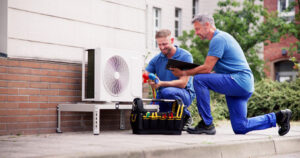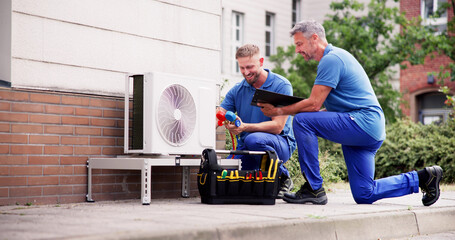When you need AC Repair Encino find a company that offers a warranty on its work. Also, find out if they require payment at the time of service or if you can pay later.
A technician will likely start by checking your thermostat. They may need to decrease the temperature setting to see if this fixes the problem.
A thermostat is considered one of the most crucial parts of any home’s HVAC system. It is responsible for controlling the temperature and function of both the heating and cooling systems, so a malfunctioning thermostat will definitely affect your ability to cool down your home effectively.
The first thing to check when your thermostat starts acting up is its settings. Make sure that it is set to provide either heating or cooling as needed and that the programmed set point is accurate. It’s also a good idea to compare the actual temperatures in your home with the temperature reading on your thermostat. If they’re different, this may be a sign that the unit is faulty.
Another possibility is that your thermostat isn’t getting enough power to run properly. Make sure that your circuit breaker hasn’t been tripped and that it is switched to the on position. If it has, reset it and test the thermostat again. You can also use a multimeter to test the electrical connections on your thermostat. Be very careful when working around electricity, however, and always consult a professional to ensure your safety.
If the thermostat isn’t getting enough power to work correctly, you may need to replace it. Be sure to have a professional handle this project, as they have the necessary skills and knowledge to complete it safely and efficiently. They will be able to help you find the right thermostat for your home and install it in the proper place so that it works correctly. This will save you money in the long run and keep your AC running smoothly all summer. This will also prevent damage to your compressor, which is a very expensive part of the air conditioning system to replace.
Low refrigerant level
When the refrigerant level drops, it doesn’t allow the coils to properly absorb heat from your home’s air. It may even cause your AC to blow warm or lukewarm air out of the vents, and this is a sign that you should call an AC repair professional. They will use special procedures to recharge the system and get it back up to factory specifications. They’ll also address any leaks that might be present as a result of a low refrigerant level. These types of repairs should always be done by professionals because refrigerants are ozone-depleting substances that require proper handling.
The best way to tell if you have a low refrigerant level is by looking at the outside unit and noticing if there’s any ice forming on any part of it. You may also notice that your electric bills have started to increase in cost.
Another good indicator is if the evaporator coils are icing over. This is a common AC problem caused by low refrigerant levels. It will also make your unit work much harder to keep your home cool, which is why you’ll start to see a higher electric bill.
Most people have the misconception that refrigerants get “used up” like gas in a car, but that’s not actually true. When there’s a leak, the refrigerant will escape the air conditioner, and you’ll need to have the system repaired in order to get it up to full capacity.
Other signs of a low refrigerant level include hearing hissing noises or bubbling in your ductwork. These are all signs that you should contact a professional to get the refrigerant refilled and the leak fixed.
Faulty Compressor
Unlike some home repair projects, fixing your own AC compressor should be left to the professionals. The compressor is the heart of your air conditioning system and one of the most expensive parts to replace. It’s also a part that can be prevented from breaking down by taking good care of it. Many times, the reasons that the compressor fails are due to things that could be avoided with routine maintenance.
One of the main signs that your AC compressor is failing is that you’re not getting as much cold air as you used to. The compressor compresses refrigerant gas and creates heat, which is then blown out by the fan to keep the system from overheating. If the refrigerant is leaking, it can cause the compressor to overheat and shut down.
Another sign that your compressor is faulty is if you notice any physical damage or corrosion on it. If you see that the compressor is bent, broken, corroded, or leaking oil, it’s time to call for professional AC repair. The AC technician will be able to determine whether the problem lies with the clutch or the compressor itself and will either be able to repair it or have to replace it entirely.
If your AC compressor is frequently tripping the circuit breaker, it’s probably because it is overheating and drawing too much power. This can be a serious fire hazard and should not be ignored. If you notice this issue, it’s best to call a professional and have them perform a detailed inspection of the compressor and unit’s electrical circuit. They’ll also test for acid buildup, which can cause the compressor to fail if left untreated.
Faulty Condenser Fan
If your AC starts blowing air but it’s not cold, the first thing to do is check your fan and compressor. Listen for a humming sound and look through the vents to make sure the condenser fan is spinning inside. If it’s not, this is a problem with your AC that should be fixed by a professional.
A faulty condenser fan can cause the rest of the AC system to overheat. This can damage other components like the compressor or evaporator coil. You’ll also notice a burning smell when this happens. It’s important to fix the problem before it becomes too serious, or you could be faced with costly repairs.
One of the most common signs of a faulty fan is when it won’t start at all. If the fan won’t turn on despite making sure all the connections are secure and the circuit breaker is set to AC mode, it’s time to call in a professional.
A fan motor that isn’t starting may be caused by a bad capacitor or a defective motor. You can check if the capacitor is bad by discharging it. Then, you can replace it by cutting power to the outdoor unit and using needle-nose pliers to separate each wire from the old cap before snapping it onto the new capacitor’s tabs.
A humming fan motor can be an indicator of a faulty bearing in the condenser fan shaft. If you can move the fan shaft easily when it’s off, the bearing is likely worn out and needs to be replaced. You can do this by cutting power to the unit, opening the vents, and removing the cover to get access to the fan motor.
Faulty Condenser Coil
When your AC condenser coil is damaged, it prevents the cooling system from releasing refrigerant and delivering cool air to your home. Typically, the damage is caused by impact or corrosion, but it can also be a sign of other problems like electrical issues that could threaten your safety.
A faulty condenser coil is one of the most serious problems your cooling system can face, which means it needs to be repaired as soon as possible. This will help ensure the system functions properly and effectively and prevent other potential problems.
The evaporator and condenser coils are critical components in the AC unit, and they work together to efficiently remove heat from your home. If your coils are damaged, it will be difficult to cool your home effectively, and you may notice unexplained increases in your energy bills.
It’s not uncommon for the coils to become clogged with debris over time, which can limit their surface area and cause them to malfunction. If you’re concerned about the state of your coils, consider scheduling regular maintenance visits to avoid damage and keep them clean.
The run capacitor is another important component of the AC unit that plays a key role in ensuring it functions correctly. This part provides the energy needed to start the fan motors, which helps the condenser coil cool the air. When the run capacitor is faulty, it can disrupt communication between other parts and lead to problems.

